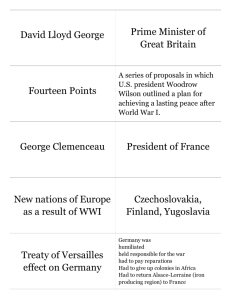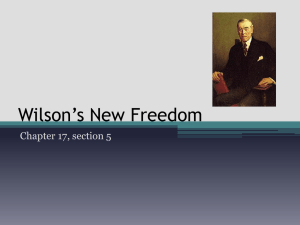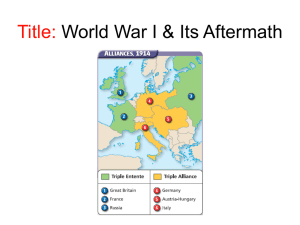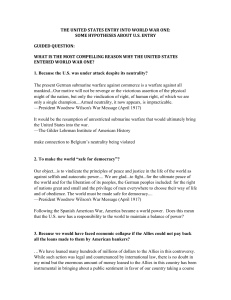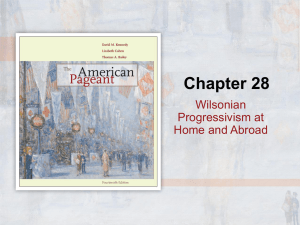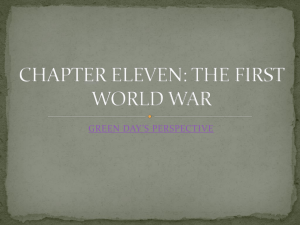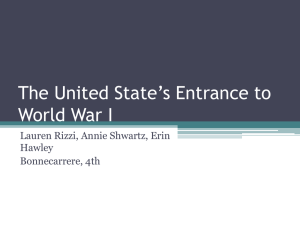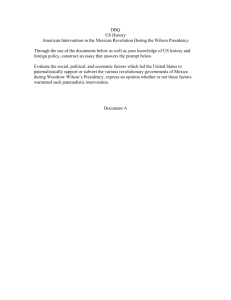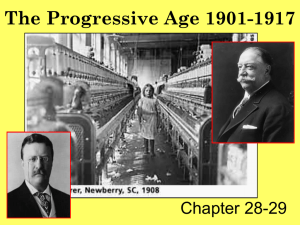ppt Wilson`s New Freedom
advertisement
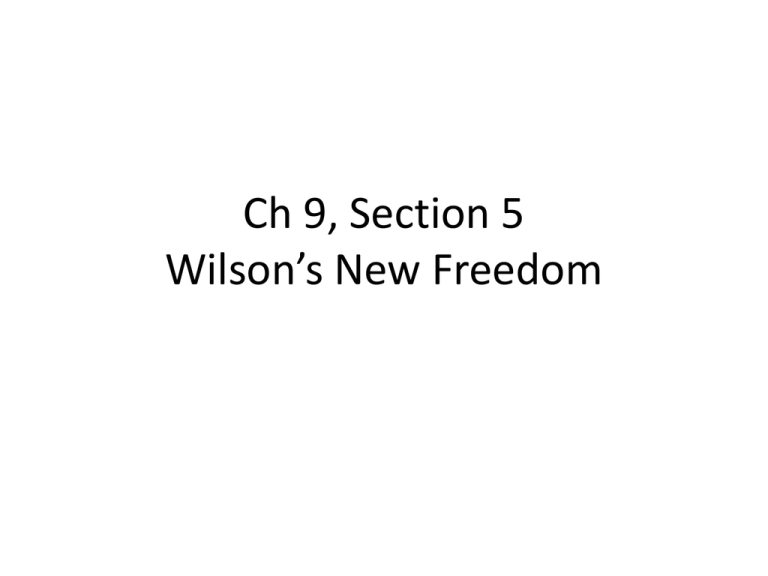
Ch 9, Section 5 Wilson’s New Freedom 1. Until 1937, on what month and day did a President’s term begin and end? • March 4th • The one exception to this was George Washington’s first term which began on April 30, 1789. His first term ended on March 4, 1793, and thus that term was a bit short of the 4 year mark. 2. Since 1937 (due to a change in a Constitutional amendment) until the present, on what month and day does a President’s term begin and end? • January 20th (Noon, EST) • The result of this change caused FDR’s first term (March 1933-Jan 1937) to be a little less than 4 years. 3. Thus, given that Woodrow Wilson won the 1912 presidential election (in November), on what day did he become President? • March 4, 1913 4. How long did (and still do) Presidential terms last? • For 4 Years • See questions one and two for exceptions involving George Washington and Franklin D. Roosevelt 5. From March 4, 1861 until March 4, 1913, which political party held the U.S. Presidency for 44 out of those 52 years? • The Republican Party 6. But from March 4, 1913 until January 20, 1969, which political party held the U.S. Presidency for approximately 36 out of those 56 years? • The Democratic Party 7. Thus, the election of the Democrat, Woodrow Wilson to the U.S. Presidency was the beginning of what kind of political era? • A half-century political age in which the Democratic Party returned as a viable national presidential party, and not just a Congressional, State-level, and regional party. 8. Woodrow Wilson’s initial profession was what? • A History Professor 9. What university did Woodrow Wilson lead? • Princeton University in New Jersey 10. In 1910, Woodrow Wilson was elected to what office? • Governor of New Jersey 11. As governor of New Jersey, Wilson was known as what kind of governor? • A Progressive 12. As president, Wilson’s program was known as what? • The New Freedom 13. In the New Freedom, Wilson planned to attack what three things? • The trusts • Tariffs • High Finance 14. What was the Clayton Antitrust Act of 1914? • A federal law that prohibited corporations from buying stocks of other companies, in pursuit of establishing a monopoly 15. The Clayton Act also declared that what organizations had rights to exist? • Labor unions and Farm organizations 16. Due to the Clayton Act, what also became legal? • Strikes, Picketing, Boycotts 17. American Federation of Labor leader, Samuel Gompers, called the Clayton Act what? • The Magna Carta for labor (He meant it as a compliment) 18. What did the 1914 Federal Trade Commission do? • It created the Federal Trade Commission (FTC) and empowered it to investigate unfair business practices 19. What did the Revenue Act of 1913 do? • Re-imposed the Income Tax • Significantly lowered Tariffs (i.e. sales taxes on imported goods) 20. What did the Sixteenth Amendment (ratified in 1913) do? • It legalizes a federal income tax on individuals 21. What did the Federal Reserve Act of 1913 do? • It established a banking system in which a network of 12 district federal reserve banks influence the money supply and interest rates • In a sense, “The Fed” serves (to this day) as a bank for the banks 22. By 1923, what percentage of American banks were part of the Federal Reserve System? • About 70% 23. As of 1910, in what 5 States did women have the right to vote in federal elections? • Wyoming, Utah, Colorado, Washington, Idaho 24. After years of protests, consciousnessraising, lobbying Congress, and other forms of political activism by advocates of women’s suffrage, what did Congress do in 1919? • Passed the Nineteenth Amendment (Granting women the right to vote) thus sending it to the states for ratification 25. When did enough States ratify the 19th Amendment, thus giving all American women the right to vote? • August 1920 (during Woodrow Wilson’s second term) 26. What was Woodrow Wilson’s record on Civil Rights for Black Americans? • Not very good • Wilson was a native Southerner and a segregationist. During his eight years in office, he did very little on behalf of Civil Rights for African Americans 27. Who won the Presidential election of 1916? • Wilson won re-election 28. When did World War One begin? • August 1914 29. Basically, regarding WWI, Wilson wanted what, at first? • He wanted to keep the U.S. out of this European war 30. But in April 1917, Wilson got Congress to do what? • Declare War on Germany, Austria-Hungary, and the Ottoman Empire • The United States had entered WWI, on the side of the Allies---namely Great Britain and France 31. The U.S. entry into WWI largely brought what to an end? • The Age of Progressivism
